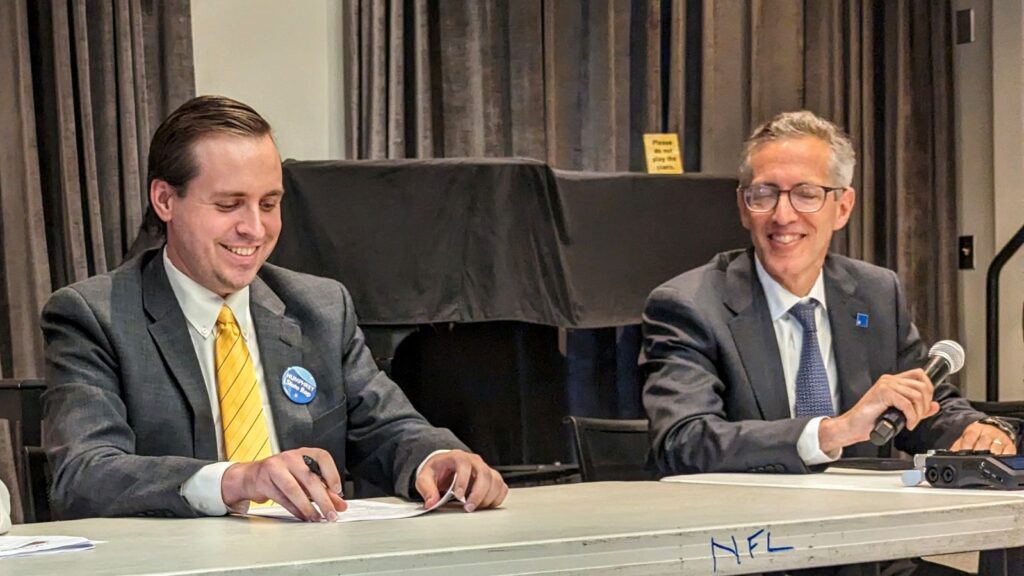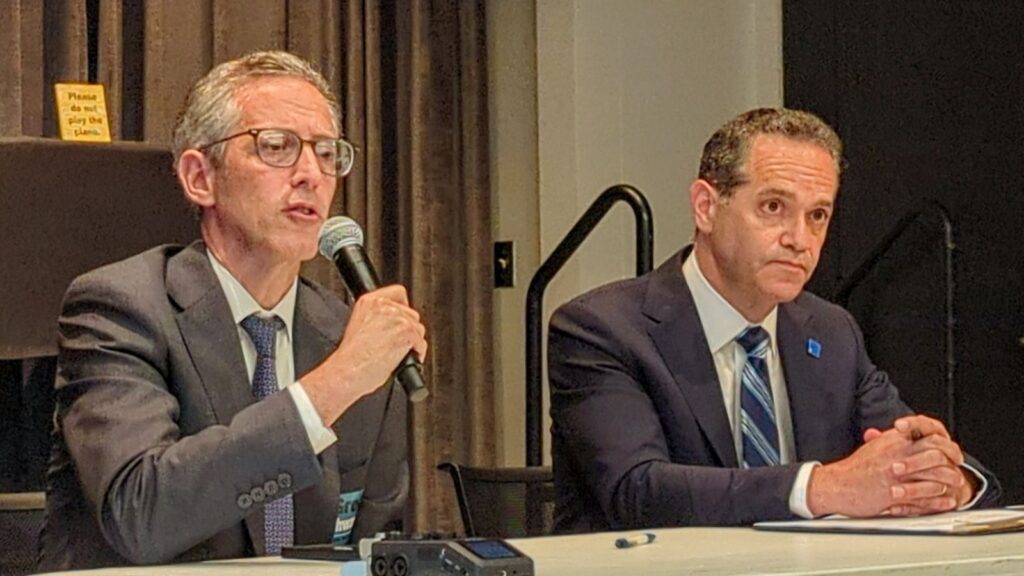Candidates for the Middlesex 12th district state representative seat—City Councilors Bill Humphrey and Rick Lipof and former City Councilor Greg Schwartz—met for another debate this week, at the Newton Free Library Monday night.
The district covers the southern half of Newton and as well as Brookline and the seat has been held by retiring State Rep. Ruth Balser since 1999.
Here are some of the highlights from Monday’s debate.
Labor unions
The first question asked how the candidates would work with local and state unions as a state representative.
Humphrey noted his endorsements from several labor unions including the local Teamsters, the Newton Teachers Association and Mass. Nurses Association. He said that as representative, he would work with those unions to help achieve their agendas.
“Our job here is to not be disciplining them and telling them what they don’t know or don’t understand, but to be listening to and incorporating into legislation the things that they’re pushing,” Humphrey said.
Lipof, who is endorsed by the police union in Newton and firefighters union in both Newton and Brookline, emphasized seeking compromise between the unions and the government.
“A contract for a union has got to also be good for the city, and when you get it done and both parties walk away happy,” Lipof said. “That’s something that I would always have my mind on.”

Schwartz said he would keep his door open to the unions but understands that he may disagree with them on some issues.
“You have to tell your friends when you differ with them,” Schwartz said. “That’s one thing, I hope, that either of my colleagues who’ve been endorsed by the unions would be able to do.”
Housing for public sector workers
The next question asked what the legislature can do to help people whose public sector salaries aren’t enough to buy housing in the cities for which they work.
Humphrey said that creating cheaper housing will require a combination of approaches including zoning changes and the use of transfer fees, which channel revenue from high-end real estate purchases to finance affordable housing projects.
“The reality is just that it’s going to take a lot of different solutions,” Humphrey said.
Lipof also advocated for a multifaceted approach, mentioning zoning reform and workforce housing, a solution that offers rental housing for people whose incomes fall in the middle and higher ends of the area’s median income, but who still cannot afford market rent prices.
“We really need to advocate for workforce housing for specifically this question,” Lipof said.
Schwartz said that the government should work with the private market through tax incentives to fund housing. He also suggested investing in rapid bus lines that could make cheaper areas more accessible to live in.
“We should be firing on all cylinders, and that’s what I would try to do with all my colleagues at the state house,” Schwartz said.
Transparency
The next question asked how the candidates would ensure transparency in their own position and how they can improve the transparency of the legislature as a whole.
Lipof pledged to send his constituents a newsletter and readily answer questions, but he cautioned that it may be difficult for a rookie representative to attempt broader change in the state house.
“I’ll tell everybody that I’d like more transparency, but I’ll tell you, there’s a nuance to go to the state house, and to become relevant and to find a way to change the culture from within,” Lipof said. “Going up there kicking and screaming isn’t gonna make that happen.”
Schwartz mentioned that the state house provides resources like televised hearings and committee meetings, and that he would try to make hearings accessible to interest groups.
“In addition to whatever transparency we can get through, you know, our colleagues and the leadership, we need to make sure that we are a source of transparency,” Schwartz said.

Humphrey said he supports the Sunlight Act, a set of state bills that would extend the public records law and open meeting law to the state legislature and require it to post committee votes more promptly.
“I think that that has become more critical than ever with the consolidation—and actual closure—of a lot of news sources that people used to rely on,” Humphrey said.
The candidates then asked each other questions.
Mapping Project
Schwartz asked Humphrey why he didn’t support a 2022 letter opposing the “Mapping Project,” an online map that claimed to show links between local organizations and Jewish institutions.
Humphrey, who was the only Newton city councilor who did not sign the letter, replied on Monday night that he would have signed the letter in the wake of attacks on Israel on Oct. 7, but that at the time, he thought the letter promoted fear, not safety.
“I believe it’s not always responsible for elected officials to shine a huge spotlight on every single fringe project that’s problematic on the internet,” Humphrey said.
Humphrey also mentioned that Lipof didn’t speak with him at the time about his concerns.
“I don’t think Counselor Lipof ever called me about it to have a conversation as to why I was maybe not signing it or maybe had some concerns with the letter,” Humphrey said.
Lipof responded.
“Antisemitism has been a problem before October 7, and it was a problem back then,” Lipof replied. “Please do not blame me, as one of the writers of this, to reach out and explain to you why The Mapping Project was such a terrible thing.”
Northland Project
Lipof asked Schwartz why he voted no on the Northland housing project (a proposed development for Needham and Oak Streets in Newton) while Schwartz was chair of the Land Use Committee for the Newton City Council and whether he would vote against the project today, given the housing shortage in the region.
Schwartz said he tended to support most development projects, but he thought the Northland project would not have bolstered public transportation and instead, would have added to car traffic on Needham Street.
“Our role on the city council and certainly our role as state legislature is not to be rubber stamps.” Schwartz said. “We need to think independently, even when it takes some courage.”
Humphrey asked Lipof what he would do if he struggled to come to a compromise with a colleague at the state house.
“Eventually, sometimes you have to move on, Lipof replied. “But if I felt very strongly about my position, I would try to change some minds and sometimes leadership can be malleable.”